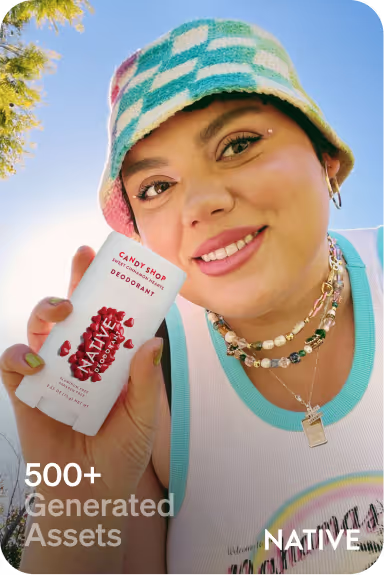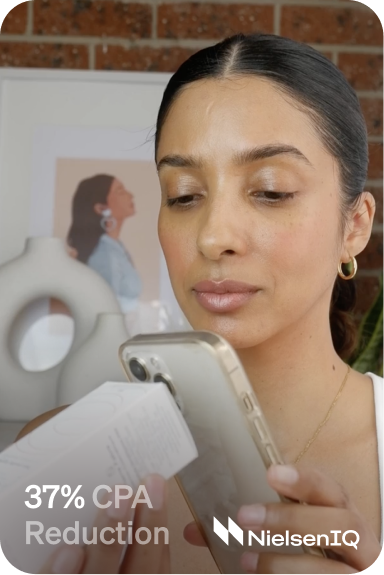No one wants to be caught on the wrong side of the authorities. And from that point of view… Dubai’s social media advertising scene in 2025 can seem tricky.
Even a poorly worded caption that crosses legal or cultural red lines can trigger unforeseen penalties that ripple far beyond one advertising campaign.
Your survival hinges on knowing the latest licensing requirements.
That’s why we’ve created this complete breakdown of the UAE Media Council’s (UAEMC’s) regulatory framework.
You’ll learn how to shape your media policy so your advertising aligns with UAE regulations and avoids expensive compliance missteps.
Let’s dive in.
P.S. If you don’t know who’s shaping Dubai's media scene, you’re already a step behind. Our Top Media Companies in Dubai list showcases agencies making mega moves.
TL;DR
- The UAE now requires social media creators and advertisers to hold the Mu’lin (Advertiser) Permit for any paid or promotional content.
- The permit applies to Instagram, TikTok, YouTube, and other digital platforms, with strict rules on disclosure, cultural sensitivity, and content quality.
- The UAE Media Council issues permits free of charge to citizens/residents, with fees waived for three years, while visitors need a Visitor Advertiser Permit that is valid for three months.
- Non-compliance risks fines and account suspension.
Overview of the UAE Media Council’s New Regulations
The UAE updated its federal media law in 2023 and followed up with detailed regulations in 2024. That set the stage for the UAE Media Council’s Advertiser Permit, officially announced on July 30, 2025.
To back it up, the council rolled out an AI-driven monitoring system that checks content in real time to keep standards high.
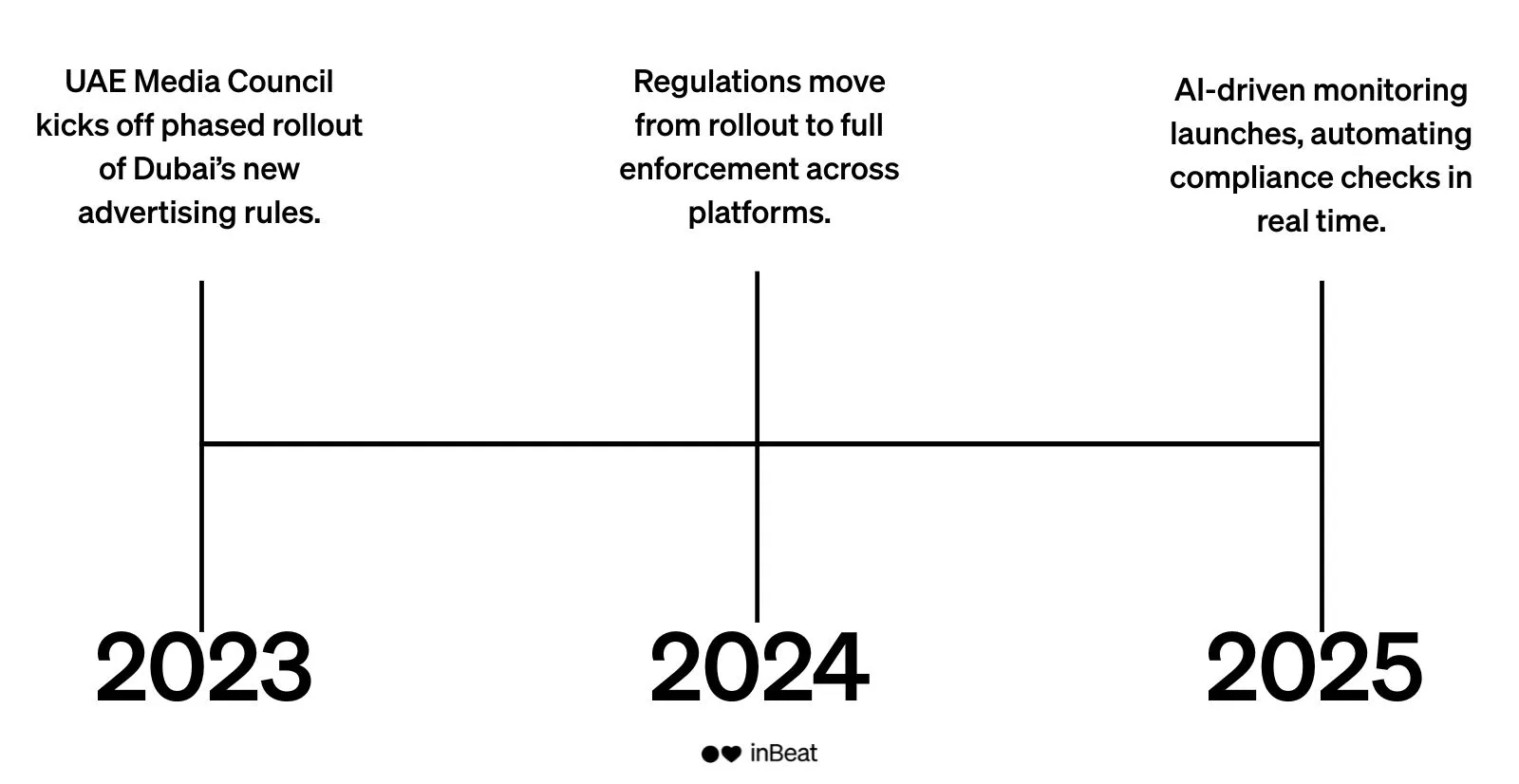
Social media ads and a thriving content creator economy power Dubai’s digital era. But with changes to advertising regulations, businesses and creators must carefully thread the regulatory ecosystem. If not, there is the risk of fines, account suspension, and campaign bans.
The UAE Media Council now oversees all social media promotions and advertising content to ensure professional standards, enhance consumer protection, and uphold public morality.
These new advertising regulations cover social media platforms like TikTok, Instagram, YouTube, and now even LinkedIn when used for promotional posts. Businesses and creative talents (including influencers) must get the Advertiser Permit to operate legally.
Dubai’s digital advertising sector is transforming, and the Advertiser Permit is a key pillar in this process. So it is crucial to align your media policy with local media content standards.
What Is Dubai’s Advertiser (Mu’lin) Permit?
The Advertiser Permit is the UAEMC’s permit for anyone posting promotional content on social media platforms (be it paid or unpaid). It’s known in Arabic as “Mu’lin” (معلن), and the council requires you to link it to your social media accounts.
It sits alongside any media and trade licenses (more on that later on) you may need, and we’ll discuss the permit below.
Purpose and Objectives
With a reported 11.3 million social media users in January 2025, which is almost 100% of the UAE’s total population, regulators are responsible for safeguarding a massive scale of users.
The UAE Media Council introduced the Mu’lin Permit system to reinforce media governance and strengthen consumer protection across Dubai’s expanding social media ad space.
Its primary objectives are:
- Have clear licensing requirements: That way, only legitimate businesses and creative talents operate in Dubai’s digital advertising sector. This reduces unvetted, misleading campaigns.
- Enhance content quality and safeguard public morality: The permit enforces media content standards that prevent offensive or misleading advertising content.
- Build a structured regulatory framework: Dubai is putting together a solid regulatory framework, with the Advertiser Permit playing a key role. It ties into their Vision 2030 goals and strategic initiatives to build a resilient media industry and turn the Emirate into a go-to digital hub.
- Boost investment: The permit makes permits free for locals and simple for visitors, so it’s easier for more creators and brands to jump in. Clear rules give businesses confidence that their ad spend won’t get lost in a messy system, which means more money flows into the market and helps the whole industry grow.
- Promote transparency and accountability: The Advertiser Permit promotes transparency because the UAEMC instructs applicants to connect their social media profiles and show their ad spending history. This helps track promotional activity and improve trust.
- Support the emerging content creator economy: Having these official licensing requirements for content creators visiting the UAE professionalizes the industry. This is great news for content creators, especially considering that the renewed media policy clearly outlines what influencers need to do.
This ties directly into the UAE’s Vision 2030, which focuses on growing the digital creator economy. The goal is to make sure all advertising follows clear, fair rules that respect local culture while keeping the industry professional.
Eligibility and Requirements
Broadly speaking, applicants must follow these requirements to qualify:
- Applicants must be at least 18 years old, though the Council can make exceptions at its discretion.
- You must have a good track record, which means that you must not have violated any media content rules in the past.
- If you’re a UAE citizen or resident, you’ll need to go to the relevant authority to get a license that’ll allow you to practice electronic media (i.e., an e-media license)..
- Individuals registered under an accredited advertising or talent management agency can get a visitor permit.
- As an applicant, you must hold a valid UAE residence or work visa; generally, tourist visa holders are not eligible unless they apply under the Visitor Advertiser Permit exception.
Now, here are the requirements you don’t need to meet to qualify for the Mu’lin Permit:
- Language proficiency: There are no stated language proficiency requirements for applicants. That said, the permit and its related application processes are available in Arabic and English. It’s worth knowing that specific Emirate-level regulations and media content standards, such as those in Dubai's Decree No. (6) of 2020 Regulating Advertisements stipulates that Arabic must be the main language used in all advertising content.
- Engagement metrics: There are no stated minimum follower requirements or engagement rates for social media accounts.
For businesses and agencies, including advertising agencies, studios, or brands, there are different eligibility requirements:
- Valid business license (trade license): You need a valid UAE-registered trade license under the media sector or related category (i.e., marketing, media, or advertising). The Council performs real-time checks with the Department of Economic Development (DED) database to ensure it is active.
- Office footprint: Business applicants must show proof of a physical office in the UAE. You’ll need a certificate of incorporation or a lease agreement (i.e., an Ejari certificate), which you can obtain from the Dubai Land Department.
- Registration with the UAE Media Council: Every business and agency needs to sign up directly with the UAE Media Council and get its Media License for Advertising. This allows you to legally create and publish ads. Keep in mind that a media license is separate from a standard business trade license; you’ll need this on top of that.
- Documentation of previous work: While this is not always required, the Media Council may need examples of past advertising campaigns or content. This is to check if your work fits the UAE’s ethical and cultural standards. The UAEMC is more likely to ask you to provide these if you’re a new or foreign company.
- Authorized personnel: You’ll need to designate someone to be its media representative or authorized signatory. This person will be responsible for content and compliance with the UAE Media Council’s regulations. The Council will require this person’s full details and identification, such as their Emirates ID or passport copy, to be submitted as part of the application for the Advertiser Permit.
- Compliance undertaking: You’ll need to sign a compliance undertaking, where you agree to follow the UAE Media Council’s Code of Ethics for Media Content. The contract basically revolves around the fact that you must avoid culturally insensitive content. Also, you must refrain from promoting illegal activities and misleading consumers.
Obligations for Social Media Content Creators in Dubai
For social media content creators in Dubai, obligations include securing a valid Advertiser Permit (the Mu’lin Permit we’ve already discussed), complying with media content standards that prohibit misleading or offensive advertising messages (also above), and ensuring clear disclosure of promotional content on social media platforms.
Let’s detail these things further.
Dubai Advertiser Permit Compliance Timelines
For businesses and content creators in Dubai, timing is crucial.
The UAE Media Council announced the Advertiser Permit (Mu’lin Permit) on July 30, 2025, and it is expected to go live around late October 2025.
You’ll have a three-month window from July 30, 2025, until late October 2025, when enforcement begins, to apply for and get the permit.
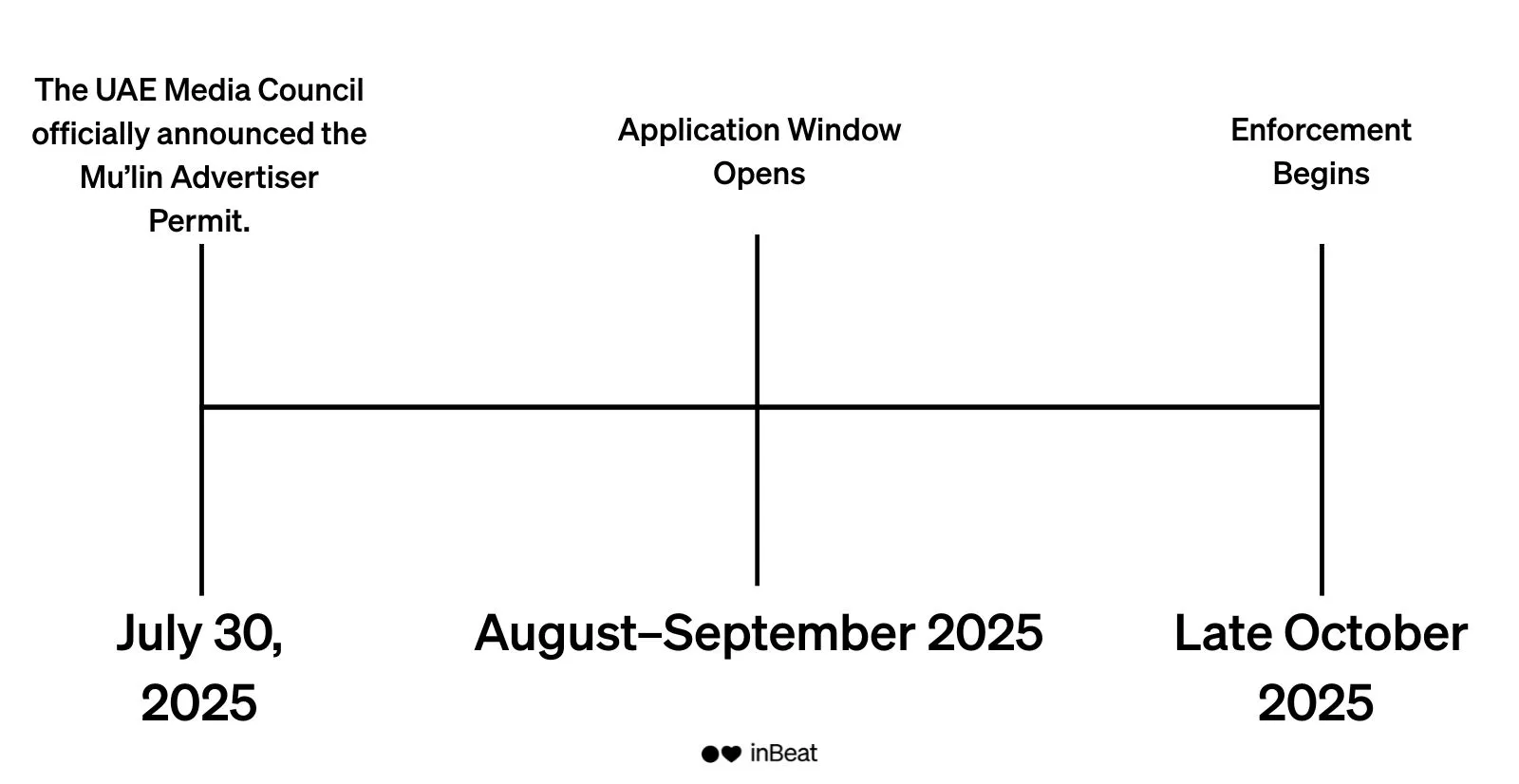
From then on, anyone posting ads on social media (paid or unpaid) must have the permit. This includes whether you're a resident, local business, influencer, or a visitor creating sponsored content while in the UAE.
What happens if you miss these timelines? Let’s break it down.
The UAE Media Council has confirmed that violations trigger warnings and escalating fines. While different regulations set fines that can reach AED 1,000,000 (~$272,300) for serious media violations, you can expect penalties for non-compliance with the Mu’lin Permit to start lower but rise with repeat offenses.
Pro tip: Build renewal reminders into your compliance calendar; aim for renewals 30–60 days before expiry. You’ll have a buffer to gather the necessary documents and avoid any glitches or downtime, without disrupting live campaigns.
Posting and Content Restrictions
Here’s what you need to know about posting and content restrictions if you’re creating promotional content in Dubai:
Prohibited Content
The UAE’s Media Regulation Law bans posts that:
- Spread misinformation.
- Incite hate or discrimination.
- Violate public morals (e.g., contain nudity or profanity).
- Contain profanity.
- Go against public decency or national values.
Disclosure Rules
Any ad or sponsored content must clearly state that it’s paid. Use labels like #ad, #sponsored, or “Paid partnership.” Best practice is to ensure your disclosure is in Arabic and/or English, so your entire audience sees and understands it.
Your permit is non-transferable, and your permit number should also be visible in your account’s bio or pinned post.
Types of Content
Whether your ad appears in the form of a feed post, Instagram Reel, LinkedIn update, or TikTok video, it must come from the registered account tied to your permit. Also, ensure your Stories have visible disclosures; don’t hide them in tiny text or under stickers.
Product Placement
Showing off a product in an unboxing video? It still counts as advertising, whether you pay or gift an influencer. Other examples include fashion hauls and food reviews: disclosure and permit number rules still apply.
Cultural Sensitivity
Lastly, avoid posting or sharing anything disrespectful to UAE culture and traditions, like revealing clothing, offensive gestures, or mocking religion. Even what you think is a “harmless joke” could result in penalties.
Dubai Advertiser Permit Application Process
Prospective advertisers can apply for the Dubai Advertiser permit through the UAE Media Council’s eServices portal on their website. You can apply for it in Arabic and English, and it’s done online only. Let's see exactly what the steps are.
Steps to Apply for the Dubai Advertiser Permit
- Register online via the UAE Media Council’s portal.
- Fill in application details, including social media handles and content type.
- Attach your trade license (if you’re a resident) or your agency sponsorship (if you’re a visitor applying via an approved agency).
- Submit your application. You can expect a processing time of around 1–2 weeks.
- Permit issued:
- Permit for UAE residents/citizens: One-year term that’s free for the first 3 years, and the residents/citizens must renew it annually.
- Permit for visitors: Get a 3-month visitor permit. Renewable once.
- Follow the permit rules: Display your license number on your social media profiles, and comply with its standards. Don’t resell your permit to another person so they have access to and post on your social media account.
Pro tip: Don’t let sloppy paperwork slow you down. Use applications like DocuSign or Adobe Acrobat to prepare and format your files before uploading them. Stick to PDF or JPEG, keep scans crisp and readable, and triple-check that names, IDs, and license numbers match exactly.
Required Documentation for the Mu’lin Permit
Here are exactly what documents to prepare.
Mandatory Documents for the Mu’lin Permit
- Valid trade license (e.g., your influencer trade license). Submit it in PDF format, and ensure it’s under 5MB.
- Copy of Emirates ID and passport. Both must be valid for at least 6 months before expiry.
- Your photo.
- Certificate of Police Clearance, which is colloquially known as a “Good Conduct Certificate,” from the Dubai Police or the UAE’s Ministry of Interior.
- Proof of active social media accounts. Provide screenshots or links that verify activity on your social media accounts.
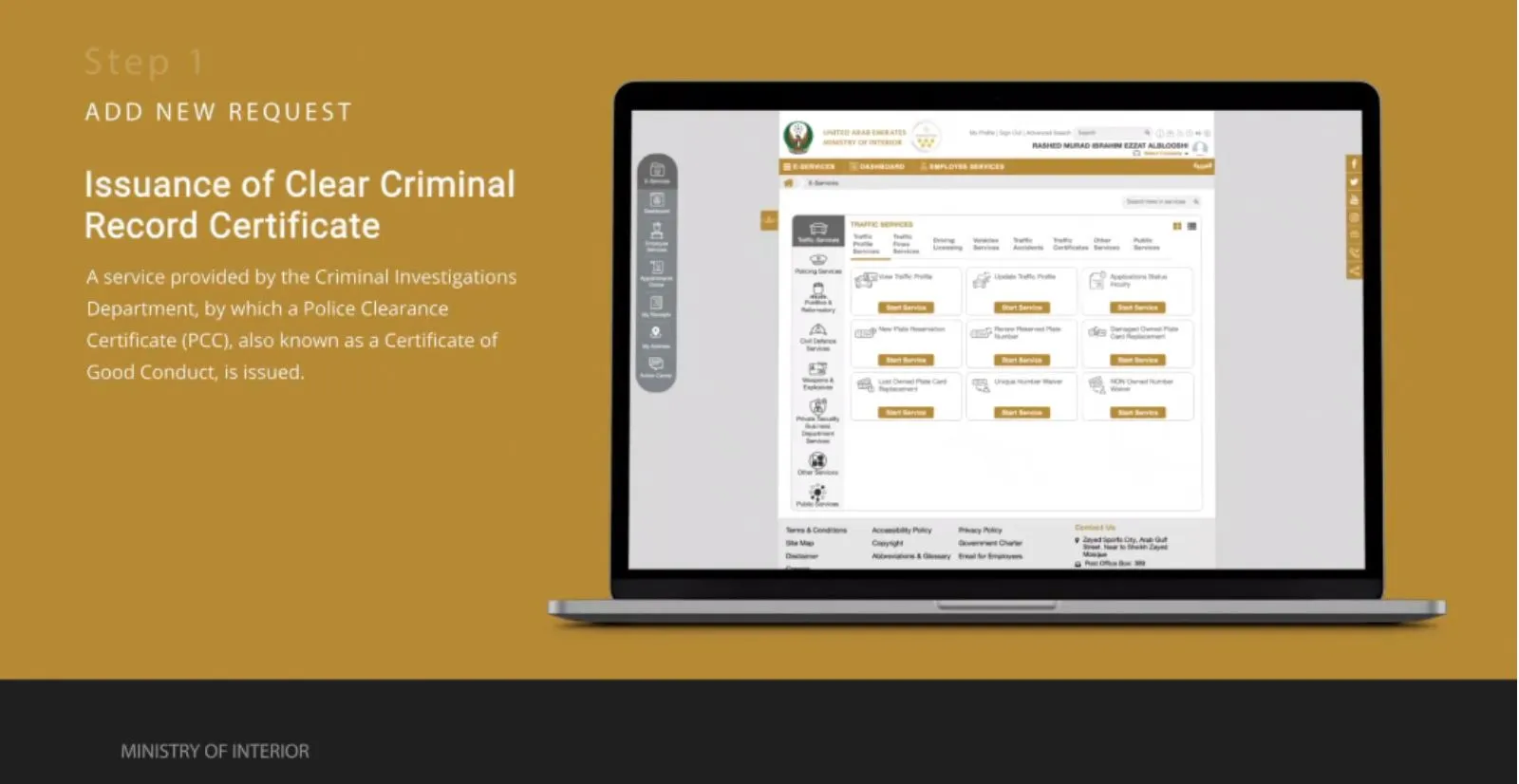
Supporting Documents for the Mu’lin Permit
- Translated contracts: Ensure you get non-Arabic documents translated and certified.
- Portfolio of promotional content: You’ll need this to showcase previous ad campaigns and/or branded collaborations if the UAE Media Council requests them.
Pro tip: Presentation matters, so use tools like Canva Pro or Adobe Express to help you format your portfolio into polished samples.
If you’re promoting ad content in Dubai, the Mu’lin Permit is necessary as it’s a gateway to compliance and securing professional brand partnerships. So gather your documents, get your license, and keep advertising activity above board.
Cost and Validity of the Dubai Advertiser Permit
The Dubai Advertiser Permit is free for UAE citizens and residents for the first three years and is renewable annually. Renewal fees may apply, though no official rates have been published yet.
The currency is the AED Emirati Dirham, and the accepted payment method is online payment via the UAEMC’s eServices portal.
That said, let’s look at the cost breakdown.
Fees Involved in Getting the Mu’lin Permit
- Mu’lin (Advertiser Permit): As we noted above, this is free for UAE citizens and residents for the first three years. After that, renewal fees are expected but have not yet been published.
- Visiting Advertiser Permit: Foreign creators must apply via a UAE-licensed agency. While the government doesn’t charge you a direct fee, agencies typically set their own charges, which are often bundled with licensing support.
- Media/Influencer License: Separate from the Advertiser Permit, influencers are still required to have one. Citizens/residents can expect to incur costs of around AED 1,000 (~$272) per annum for the e-media license issued by the UAE Media Council or related authorities. If you’re a visitor, expect to pay AED 500 (~$136) for a three-month influencer license.
- Trade License: Required for residents doing commercial advertising. Trade license fees vary widely depending on the emirate and setup type (i.e., mainland vs. free zone):
- eTrader license (individual running an online business): ⁓AED 1,370.
- Free zone setups: from ⁓AED 15,000 ($4,084) (in Dubai Media City).
GCC Comparison: Mu’lin Permit vs. Neighboring Countries
Dubai Advertiser Permit Duration
The Mu’lin Permit is valid for one year from the date of issue for UAE citizens and residents. Once you get it, you can plan medium and long-term campaigns without disruption.
This one-year term also makes it easier for marketers to structure seasonal strategies. And that’s something we also see in global influencer campaigns, where long-term planning is key to ROI.
The Visiting Advertiser Permit is valid for three months, though. If you get this one, you have some flexibility for short-term, micro-influencer collaborations.
Both types of permits are renewable for the same length as their original validity period, with the Visitor Advertiser Permit being renewable once (i.e., being valid for a maximum of up to six months).
What Are the Renewal Timelines and Auto-Renewal Options?
While several media sources, including the UAE Media Council, state that both types of permits are renewable, there’s no mention of a mandatory renewal timeline.
That said, we recommend that you factor in renewals around 30 days before their expiry. That way, you have enough time for processing and can make sure your campaigns continue without disruption.
There’s no auto-renewal option, so you must manually apply for renewal at the end of each validity period.
What If Your Permit Expires?
Since permits aren’t auto-renewed, you lose your right to legally advertise on social media once your permit lapses.
The result? You must stop all your social media advertising activity immediately; otherwise, you risk penalties.
What Are the Consequences of Advertising Without a Valid Permit in Dubai?
Posting promotional content on social media without a valid Advertising Permit can lead to consequences ranging from a written warning to a fine of AED 50,000 for the third offense. Repeating this violation can lead to the fine being doubled.
Exemptions and Special Provisions for the Dubai Advertiser Permit
The Dubai Advertiser Permit includes certain exemptions and special provisions for government entities, to name a few. Below, we'll discuss qualification criteria, key provisions for visiting advertisers, and more.
Who Qualifies for Exemptions for the Dubai Advertiser Permit?
Not every social media profile requires a Mu’lin Permit. The UAEMC outlines clear exemptions:
- Personal Accounts: Individuals using social media accounts strictly for personal updates, not advertising activity or promotional content, do not require permits. This includes hobbyists sharing personal passions, such as travel photos or cooking tips, without monetization.
- Under 18s: Content made for educational, cultural, athletic, or awareness purposes, as long as it is aligned with age classification laws.
While not technically an exemption, Clause (5) under Article 12 of Federal Media Law No. 55 of 2023 states that, “The provisions of Clause (1) of this Article shall not apply to digital platforms affiliated with federal and local government agencies, and digital platforms of schools, institutes, universities, and governmental and private colleges accredited by the authorities concerned with education in the State, as well as any other platforms and sites determined by the Council.”
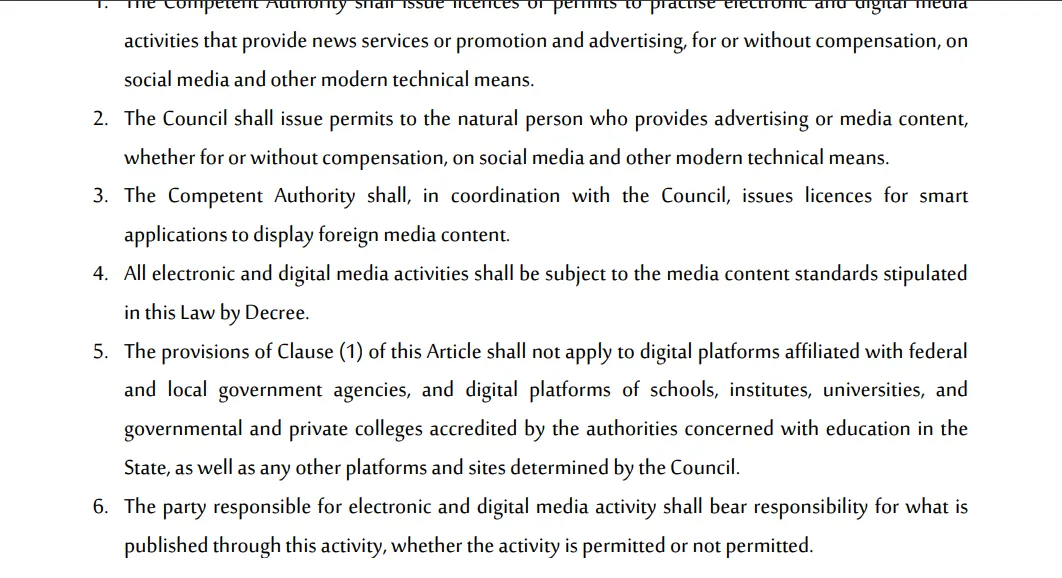
Partial exemptions exist, too, but with narrowed criteria. For example, micro-influencers who engage in barter deals (free products in exchange for posts) are no longer “exempt.” Before Federal Media Law No. 55 of 2023, barter deals were treated informally, as influencers could post content in exchange for free products or services without needing a permit.
That’s changed now.
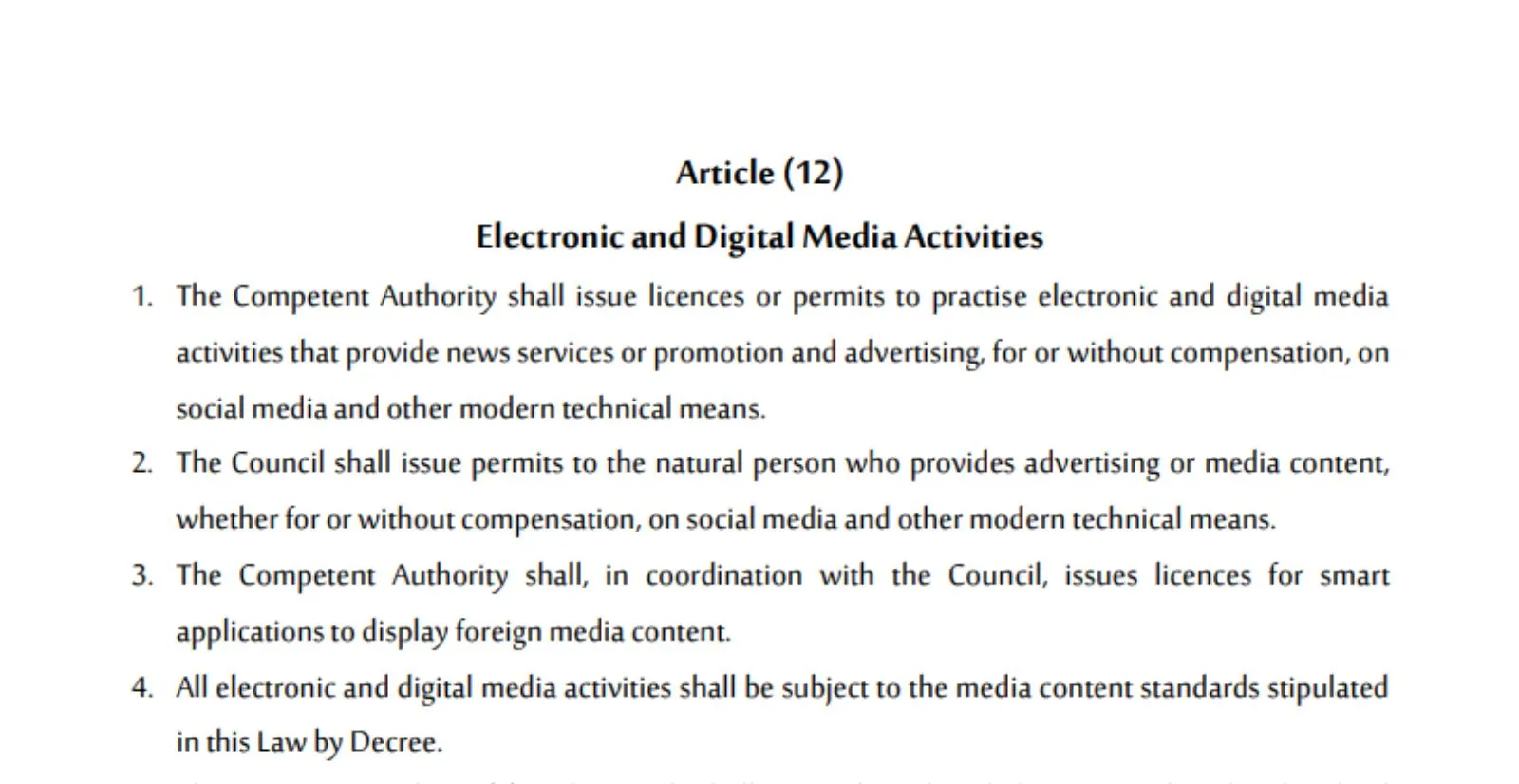
Under the law’s “Electronic and Digital Media Activities” provisions, Clause (2) states that, “The Council shall issue permits to the natural person who provides advertising or media content, whether for or without compensation, on social media and other modern technical means.”
Want to Apply for Exemption Recognition for the Dubai Advertiser Permit?
You don’t need to worry about the Advertiser Permit if you’re just promoting your own registered business or services on your personal account. Or if you’re under 18, and sharing cultural, athletic, or awareness-based content. These are automatically exempt; no need to apply for exemption.
Key Provisions for Visiting Advertisers
A visiting advertiser is a business or content creator visiting the UAE temporarily to conduct advertising activity on social media platforms. Instead of the Mu’lin Permit, you can apply for the Visitor Advertiser Permit if you fit in this category.
Here’s a rundown of key provisions:
- Duration: The Visitor Advertiser Permit typically lasts 3 months, and permit holders can renew it once for an additional 3 months. So it lasts for a maximum of 6 months. Plan your campaigns over three months to align both timelines.
- Eligibility: You’re eligible if you have an international advertising agency or brand. Social media influencers working with council-approved, UAE-licensed advertising or talent management agencies also fit in this category. And you must apply for the permit if you publish content targeting local consumers.
Remember: Companies contracting visiting creators should only hire creators who hold the permit. For instance, a visiting fitness influencer promoting a Dubai gym must get this permit before posting promotional social media content targeted at UAE consumers.
- Visa and work requirements: The visitor permit does not replace immigration or visa requirements. Depending on your campaign activities (commercial shoots or paid services, etc.), you may still need appropriate entry permissions or work arrangements. That’s whether you are a creator or your brand. So, work with immigration and your sponsoring agency to coordinate permit registration.
Relationship With Existing Influencer Licensing
The Mu’lin Permit adds to existing requirements (trade licenses and other UAEMC media approvals), rather than replacing them. You’ll need all three to run paid or promotional content in the UAE.
Let’s break down what that really means.
Comparison With Previous Framework
Before 2024, social media influencers in Dubai operated under the National Media Council (NMC) e-media licenses, which typically sat alongside a business (trade) license. In 2023, Federal Media Law No. 55 of 2023 refreshed things by requiring licenses to practice media activities.
The Advertiser Permit (Mu’lin) was added in 2025 for any promotional content, paid or unpaid, on social media. This doesn’t replace your business license; it adds a clear, ad-specific compliance layer.
Key changes include stronger emphasis on disclosure, explicit coverage of unpaid/barter promos, and a three-year fee holiday on the Mu’lin permit for residents/citizens.
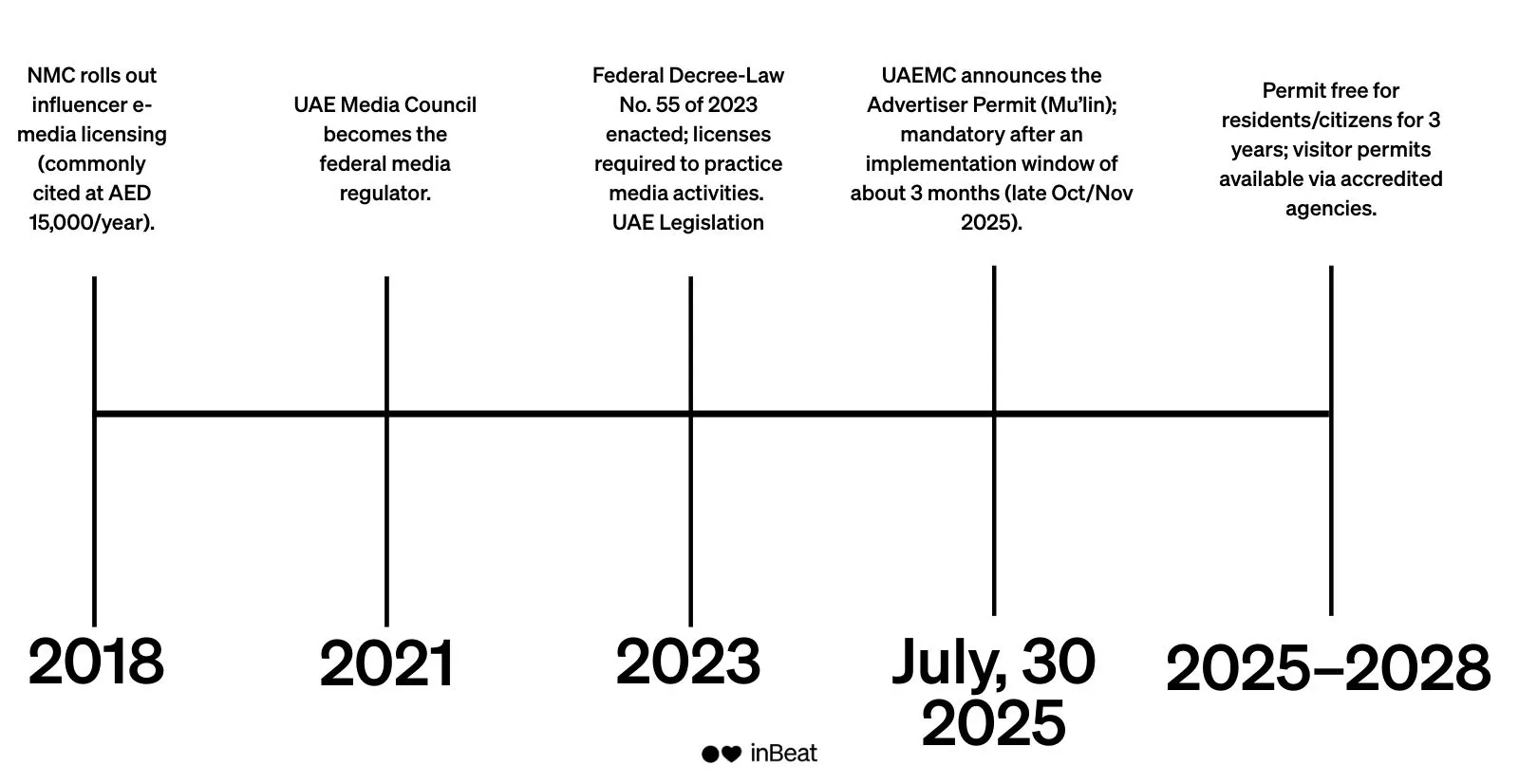
Earlier, influencers needed just two licenses; now, it’s three.
The new Advertiser Permit is part of Dubai’s push to tighten media governance. That’s why they’re adding clearer rules around transparency and compliance, even if that means increased paperwork for you.
Opportunities and Challenges for Content Creators in Dubai
Dubai’s regulatory framework creates clear opportunities and hurdles for content creators. Being compliant gives creators access to the digital economy. In contrast, non-compliance exposes them to certain issues. We’ll tackle both opportunities and challenges next.
Potential Growth Areas for Content Creators in Dubai
The UAE Media Council’s regulatory framework is transforming content creation in the region. Their goal is to create a more stable market that attracts investment.
According to Mordor Intelligence, digital transformation in the Middle East is accelerating at a 24.33% CAGR through 2030. So content creators with valid permits can capitalize on this growth.
Sources like Statista paint a similar picture.
The UAE is projected to spend around AED 1.642 billion (~$447 million) in social media advertising. These numbers present immense opportunities. If creators are compliant, they can cash in on a regulated and rapidly expanding market.
Legal Risks in the Dubai Advertising Market
But here’s the catch: the same regulations creating this stable market also carry serious consequences for those who are not compliant.
We already discussed the consequences of not holding a Mu’lin Permit. Now, let’s look at other issues:
- Content violations: Breaching media content standards can result in the authorities taking down content. Examples include going against public morality, posting someone without their consent, and breaching someone’s privacy. The UAE Media Council can monitor and remove content that violates laws, such as the Cybercrime Law, and national standards.
- Regulatory approval delays: Missing deadlines for regulatory approvals can suspend your advertising activity, and submitting incomplete applications or not submitting them on time can lead to delayed projects. In the case of commercial filming, say with influencers, even your permits can be cancelled. That entails a slew of consequences, from PR issues to profit loss. Brands should be aware of this and factor it in when developing an influencer marketing crisis management strategy as part of their overall plan.
- Undisclosed promotional content: UAE consumer laws require advertisers to separate advertising from editorial content. If you’re promoting content online, you must make it clear that you’re advertising. Otherwise, the authorities could see it as deceptive/misleading and a violation of consumer protection rules.
Let inBeat Help You With Dubai’s 2025 Advertising Rules
When you make sure your social media advertising adheres to Dubai’s regulations, you make every advertising dirham work harder.
Staying compliant is not just about avoiding fines (though that’s also genuinely important).
It’s also about cultivating trust with your target audience and protecting your brand in this market.
If your social media ad campaigns just aren’t getting the traction they deserve, inBeat Agency is your best bet.
We create top-tier UGC and influencer content that keeps your ads compliant, your creatives fresh, and your ROAS climbing higher than before.
Why wait? Book a strategy call with us today and go from compliance to conversions!
FAQs
Is Social Media Advertising Regulated in the United Arab Emirates (UAE), Specifically in Dubai?
Yes, the UAE Media Council now strictly regulates social media advertising in all seven emirates. The government office announced the Advertiser (Mu’lin) Permit on July 30, 2025, and it becomes mandatory from late October 2025.
Meanwhile, in May 2025, the UAE Media Council deployed its first AI-powered monitoring platform to enforce content quality in real time. And given that 60% of advertising spend is digital (see more social media statistics), the UAE’s monitoring system is a step in the right direction.
What Is the ‘UAE Advertiser Permit’ for Social Media?
Anyone, be they an individual or a business, must hold an Advertising Permit if they’re promoting products or services on Instagram, TikTok, or similar platforms in the UAE.
It sits on top of your existing licenses and aims to ensure everyone follows Dubai’s advertising regulations, which entail being transparent about paid content with hashtags like #ad or #sponsored.
When Did the UAE Media Council’s New Regulations Come Into Effect?
The updated Federal Media Law (No. 55) came into force on May 29, 2025, mandating that all content creators have licenses. The UAEMC announced the Mu’lin Permit on July 30, 2025, with enforcement starting around late October 2025.
The council’s AI-monitoring tool went live in May 2025.
What Are the Rules for Influencers in Dubai?
Influencers in Dubai must have a valid Mu’lin Permit from the UAE Media Council, which is free for residents for three years, with a three-month visitor option available.
They must follow rules, such as clearly disclosing partnerships using “#ad” or “#sponsored,” and avoiding content that breaches public morality or cultural sensitivity. Influencers must also follow Dubai’s advertising regulations on accuracy and must not be misleading.
What Are the Rules for Advertising in the UAE?
UAE social media laws and traditional media frameworks govern advertising in the UAE, which stipulate that advertising must be: transparent and correctly labeled, and compliant with content standards.
Traditional advertising in the region faces strict rules on alcohol, gambling, and political content. Fines for violations can reach a hefty AED 1,000,000 (~$272,294) and be doubled for repeat offenses (Federal Decree by Law No. 55 of 2023, UAE).
How Do I Advertise in Dubai?
To advertise in Dubai, you must comply with Dubai’s advertising regulations and get a valid Mu’lin Permit from the UAE Media Council.
Here’s what the process involves:
- Apply for your Advertiser Permit through the UAEMC’s official portal.
- Submit the required documents, such as your Emirates ID/passport, a valid trade license or freelance permit, and e-media license.
- Select the correct type of permit (i.e., either the standard Mu’lin Permit for residents or the Visiting Advertiser Permit).
- Keep your advertising content culturally respectful, avoid restricted categories, and stick to the disclosure rules.





.svg)
.svg)
.svg)
.svg)


.svg)








